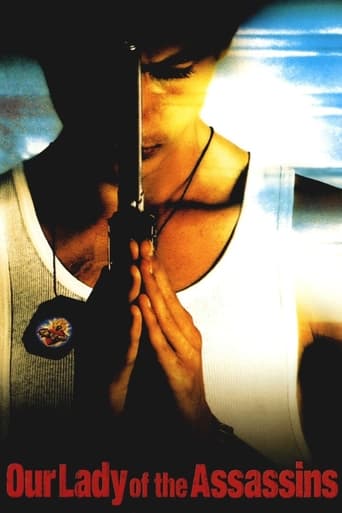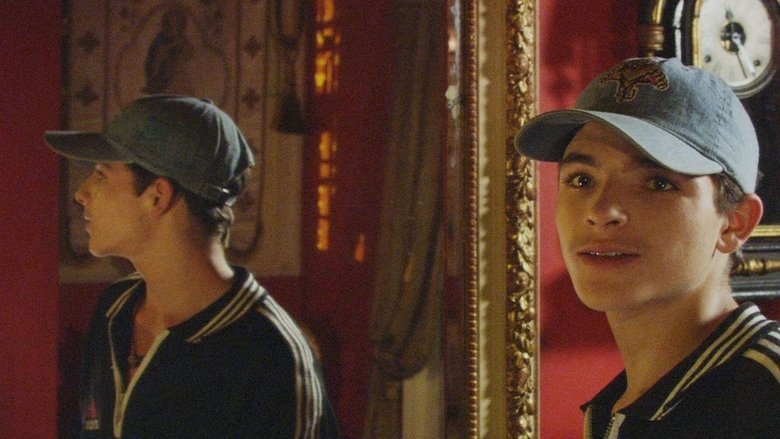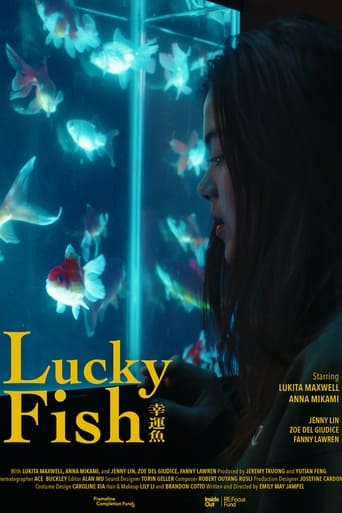

Our Lady of the Assassins (2000)
World-weary author Fernando has returned to his native Colombia to live out his days in peace. But Fernando's once-quiet hometown has become a hotbed of violence, drugs, and corruption. On the brink of despair, Fernando meets Alexis, a beautiful but hardened street kid who lives by the rule of the gun. Together, they forge an unlikely relationship.
Watch Trailer
Cast
Similar titles
Reviews
The Age of Commercialism
By the time the dramatic fireworks start popping off, each one feels earned.
It's simply great fun, a winsome film and an occasionally over-the-top luxury fantasy that never flags.
The tone of this movie is interesting -- the stakes are both dramatic and high, but it's balanced with a lot of fun, tongue and cheek dialogue.
In a way, I've been looking for a better "Breathless," for years. The original, the template, struck me as more of an essay on the emptiness of French film than anything else. It did create a narrative tone, but that tone required the absence of narrative structure. The story was that there was no story. It seemed possible for there to be something a bit more complex than a selfaware void and reference to American gangster films.We have that here. Its the same form: life has somehow locally had the plug pulled on purpose. A writer appears back home after a successful life at creating narrative and now discovers its all used up. He is prepared to die. The movie consists of several adventures with death, several dream-hallucinations that present a narrative of death (with a character that appears in "real" life and announces death), and a number of encounters with story in music and religion. Any of the encounters with death might be successful and the rest of the movie that during-death vision. Or any of it could be the author's writing of what happened before prompted by what happened before. Or it could all be post-death, which is to say post- writing. It still is all suspense and on the surface no movement, but the viewer moves as the narrative possibilities increase.Oh. He's gay and there's some folding of his character with a dead woman saint contained in the crypt of a certain church. So the "lady" is himself. In this world of coke, murder and perversion, no one smokes.Ted's Evaluation -- 2 of 3: Has some interesting elements.
Barbet Schroeder demonstrates brilliantly in Our Lady of the Assassins (2000) that he still has a genius for directing art-house masterpieces. His first foreign-film in over ten years, is at turns violent, comical and touching. Fernando (played by German Jaramillo) is a writer who's been living abroad for many years and he has come back to his crime-ridden birthplace, Medellin, to kill himself. His goals in life having been completed, he is ready for death. Or is he? At a party his first week in town, Fernando meets Alexis (Anderson Ballesteros), a 15 year old siccario, or street assassin, who works for Pablo Escobar. Beautiful and carefree, Alexis lives by the gun and carries his weapon everywhere, even into church, always on the look out for enemies and men who want to kill him. Much of the movie, lavishly shot with a hand-held digital camera, focuses on the love affair of Fernando with Alexis, he buys the kid anything he wants and lets him live in his luxury apartment (strangely empty, Fernando tells him that he has all he needs, a good view and plenty of good books) and they wander Medellin, comically in search of a taxi driver who will play good music instead of poppy garbage. Along the way of their savage journey, Alexis kills plenty of people, some for mouthing off, a neighbor for playing drums way too loudly at night and even a machete-wielding cabby who is offended that Fernando calls his music garbage. It is a strange kind of love between the two, but it is a love that reaffirms Fernando's passion for life, even when, as seemed fated to happen, Alexis finally gets killed. The gunfight scenes are amazing, the camera work, lighting and acting all give the impression to the viewer that we are there, witnessing the violence that Medellin's inhabitants have become completely inured to. The sex scenes are never distasteful but instead are somehow touching. The actors portray Fernando's cynicism with the violent world around him and Alexis' passion for life, despite his accepting that he can only survive by killing for both pleasure and money, masterfully. Another masterpiece by Barbet Schroeder, easily on a par with his earlier works such as Barfly and Maitresse. Part surreal odyssey, part machine-gun symphony, part allegory, this film speaks volumes on many different subjects.
Worth seeing, as the story is touching, and shows that love can exist in places where you'd least expect to find love or affection. Violence and love can co-exist within a framework or unorthodox love, with several plots twists concerning the young semi-macho men in the movie.Tragic ending, showing the continuance of unfortunate circumstances prevailing over heartfelt love bonds.The film currently showing how life moves on in a tragic city, [ Mendelin], filled with violence and senseless death. Touching how the younger men are influenced to overcome their violent paths through mediation and contact with the older mentor man.
This movie is modest, and certainly flawed in some respects, but overall very impressive, and very disturbing. I cannot speak to how accurately it depicted Colombia, or Medellin in particular. What struck me was that Fernando, brooding and cynical in his middle years (not "elderly"--please!), often bringing up his own wish to die, is at first reinvigorated by his relationship with Alexis--young, enthusiastic, seemingly almost angelic--but completely absorbed into the culture of death that surrounds him. Fernando is disturbed by the anger and the callous, nonchalant attitude toward death and killing that he encounters everywhere he goes, and even in Alexis. But he is less disturbed by it as time goes by. And at times Alexis kills on his Fernando's behalf--for instance, shooting a neighbor about whom Fernando complains because the neighbor's late-night drumming keeps him awake at night. As Alexis's companion, Fernando himself is drawn into this culture of death. And at times, his own anger and his inability to keep quiet about his contempt for many of the people he encounters incite the situations that result in Alexis killing "for" him. This, to me, was a particularly compelling aspect of this film--the way in which Fernando, shocked and disgusted by the death and killing that surrounds him, becomes so much a part of it--and, at times, is even exhilarated by it, even as he sees the moral dilemma his "participation" in it represents for him.When Fernando shoots an injured, suffering dog as an act of mercy--yet something which Alexis, so callous about killing people, cannot bring himself to do--he (Fernando) is so bitter and upset that he threatens to take his own life. When Alexis wrestles the gun from Fernando, the gun is lost; Alexis loses his protection and is soon shot and killed. By saving Fernando from himself, Alexis loses his own life.Fernando later meets Wilmar, another teenager who at first seems so sweet and innocent that it seems almost jarring (to me, at least), when he later removes his gun. And, yes, it is a bit soap-opera-ish to learn later that it is Wilmar who had shot and killed Alexis, but when he explains to Fernando--who is ready to kill Wilmar when he learns that Wilmar is the killer--why he had killed Alexis, his answer seems so simple, and so devoid of emotion, that it is truly disarming--literally, in fact.As disdainful as Fernando is of his countrymen, and as aloof of the anger, callousness and death around him that he pretends to be, in his attempt to regain his own life and happiness, he finds himself more and more a part of it. To me, that is what is so artfully, even masterfully, shown in this film. That is what makes it moving and disturbing.And I thought the acting rocked. Also, I cannot understand comments about how this movie is filled with gay sex scenes. There is a little bit of embracing, a little kissing, a few scenes of Fernando lying in bed with Alexis and/or Wilmar, and a lot of scenes of Fernando walking around town with one or the other of them.I do agree that the English subtitles are pretty awful. My Spanish isn't good enough to have been able to do without the subtitles completely, but it is good enough to realize how much dialogue was missed, or poorly translated.








